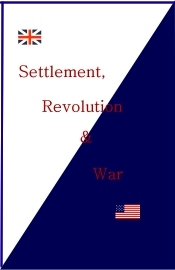
 Book #2: Settlement, Revolution & War.
Book #2: Settlement, Revolution & War.
The British government up to the time of the American Revolution pursued a policy known as mercantilism. It was based on the premise that national wealth and power were best served by increasing exports and collecting raw materials in return, particularly precious metals. The purposes of the mercantile system were to be accomplished by state action, state action which, as far as the American colonies were concerned, was somewhat heavy handed. It was simply part and parcel of this policy that the mothering nation, the nation which founded the colonies in the first place, was to exercise control over economic life by regulating production, encouraging foreign trade, levying duties on imports to gain revenue, making treaties to obtain exclusive trading privileges, and exploiting the commerce of the colonies.
Mercantilism was an economic policy followed by England since at least 1651, the year when the first of the Navigation Acts were passed.1 These acts were designed to cripple the competition as was principally had from France, Spain and Holland. Under these acts, which continued right up to the time of the American Revolution, there was "enumerated" certain commodities. These "enumerated" commodities, notwithstanding that a better price might be had in the European market, could only be shipped to Great Britain.
"The commodities thus singled out for the mother country's monopolization were those generally regarded as essential to the wealth and power of the state which were not produced in the British Isles themselves: sugar, tobacco, cotton, indigo, and dye woods - the oil, rubber, and steel of modern imperialism. No country could hope to attain self-sufficiency without an ample supply of these semitropical products; and by enumerating them England hope to relieve herself of dependence upon France and Holland and, ultimately, to oblige those powers to buy from her."2
The most valuable commodities of the time were to be found in the southern colonies. The northern colonies, the "New Englanders," and which up to the time of the American Revolution would include the province of Nova Scotia, just had to make out best way they could. Smuggling along the coast became, for some, a way of life; and New England merchants developed dealing into a fine Art. "New Englanders possessed a canniness in trade that staggered even the Scotch; and they were masters of the art of slipping a cargo of contraband past the inefficient and undermanned colonial customhouse."3
The triangular trade between the colonies, the West Indies and Britain was described by Miller as follows:
"Perhaps the bitterest rivalry within the empire lay between the British West India planters and the New England merchants and rum distillers. New England4 floated in a sea of rum; and without a free flow of molasses from the French West Indies the Saints would be left high and dry. New England and the Middle colonies exported large quantities of fish, flour, horses, and lumber to the French, Dutch, and Spanish West Indies and received in return specie or molasses. This was the Northern colonists' chief source of specie and it enabled them to continue to buy British manufactures despite their adverse balance of trade with the mother country. The molasses procured from the foreign islands was carried to the New England distilleries where it was manufactured into run to be sold to thirsty Americans, Indians, and fishermen on the Newfoundland banks. Rum was also extensively used in the so-called triangular trade. New England ships, heavily laden with this potent liquid which bore the nickname of "Kill-Devil," crossed the Atlantic to the coast of Africa, where the rum was exchanged for slaves. The slaves were carried to the West Indies and exchanged for specie or for more molasses with which to manufacture more rum to be used in the purchase of more Negroes. ...
Because of the "system" the Americans were obliged to deal with the representatives of the British buyers. Exchanges were made for manufactured goods in return for the raw products of the colonies. I say exchanges, because there was hardly any money in the colonies to pay for anything.6 These exchanges, more often than not, left the American merchants with British creditors. Americans "like conspirators and revolutionaries the world over ... were deeply in debt and eager to be free from their creditors. ... [The resident representatives], particularly the Scotch, were regarded as an alien breed -- money grabbers and cheats ..."7
Only Jamaica, of the British West Indies, could offer a considerable supply of molasses, but it was far more expensive than the molasses sold by the French West Indies. The French government forbade its subjects overseas to manufacture rum lest it compete with French brandy - consequently the French sugar producers were obliged to dump their molasses unless the American traders took it off their hands. This the Americans did gladly, but they virtually set their own price. The British planters, on the other hand, placed a relatively high value upon their molasses, which they were free to manufacture into rum. As a result, the bulk of the business went to the foreign islands: of the 14,000 hogsheads of molasses annually imported in Rhode Island, only 2500 came from the British plantations. ...
The mercantilists regarded the British West Indies as the cornerstone of the empire. The islands were almost completely dependent upon the mother country for their manufactured goods; they gave employment to large numbers of English ships and seamen; and as producers of sugar, indigo, and cotton they enabled the empire to achieve in a large measure the merchantilists' goal of self-sufficiency. Moreover, the planters and their merchant allies constituted a powerful pressure group in English politics. Altogether, while New Englanders were tolerated in the household, the West Indians were spoiled darlings of the family."5
[NEXT: Pt. 2, Ch. 4 - "The Deep Roots of Discontent."]
